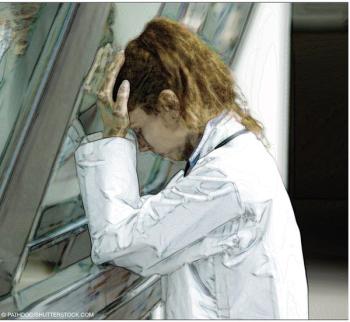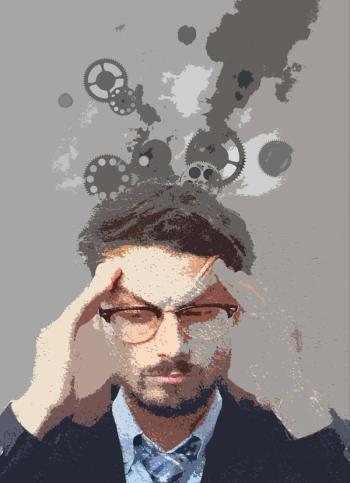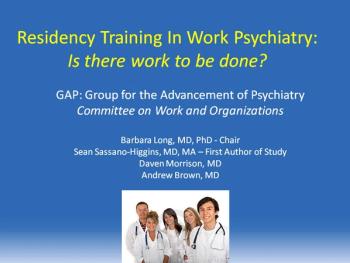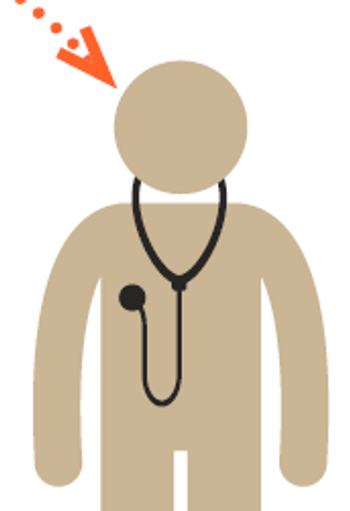
Over the past 10 years, a growing literature has documented the significantly increased rates of stress, burnout, depression, and suicidal ideation in medical students.

Over the past 10 years, a growing literature has documented the significantly increased rates of stress, burnout, depression, and suicidal ideation in medical students.

To some external observers, it may seem like psychiatrists just go through the complicated mechanics of making a diagnosis, developing a treatment plan, and prescribing needed interventions. But there is so much more to it.

Trying to change behavior-in programs as well as people-often evokes tenacious resistance. Writing for the better can become a vehicle for that change.

Like residency, the Tibetan Buddhist tradition of Sand Mandalas requires teamwork to accomplish a common goal. The group effort by both Sand Mandalas and residents results in a transformative experience.

An analysis of symptom severity across domains may enable us to reevaluate how we categorize symptoms within the spectrum of psychotic illness.

The ABIM is not sure whether the MOC program accomplishes a critical goal of ensuring maintenance of physician competency and has suspended the Practice Assessment, Patient Voice and Patient Safety requirements of MOC for at least 2 years.

We present the case of a patient for whom different attending providers had markedly different interpretations. As the case unfolds, we invite you to reflect on your diagnostic understanding of each presentation.

It has been estimated that depression alone results in a loss of $31 billion per year for employers. This slideshow reports findings from a survey on work psychiatry.

The case for training residents to conduct evaluations of impairments in patients with chronic mental health issues.

Having just completed my first year as an attending physician, I realize that there is simply nothing that prepares you to be an attending-except being an attending.

In psychiatry, we do not complete physical exams; much of our diagnosis is born out of our observations, interviews, and conversations. Other medical fields, particularly surgery, require manual, technical, and motor skills. In this manner, psychiatry is unique. More in this commentary.

Regulatory bodies that oversee hospitals and graduate medical education have begun to place an ever growing importance on patient safety and quality improvement, from which psychiatry is not immune. More in this case study.

The topics in this Special Report provide a broad picture of the issues psychiatrists face as they take a clear-eyed look at the opportunities and challenges in the emerging health care system.

Psychiatrists are particularly susceptible to burnout because of the nature of their work and the populations they serve. Combat strategies here.

We do not have to set time aside to do something that helps validate our experience, while simultaneously coping with it. The lesson expressed in this psychiatry resident's poem.

Sometimes when you complain for long enough about the disastrous nature of something, you end up being nominated to fix it.

During the first year of her child and adolescent psychiatry fellowship, this psychiatrist received an invaluable lesson regarding the importance of “treating the whole patient” in this case, a 16-year-old patient who is pregnant.

Psychiatric treatment requires primary intervention and solid follow-up care, like diabetes, hypertension, and other medical conditions. More in this commentary by a resident in psychiatry.

As practicing physicians, we constantly ask ourselves when and where to alert patients to bad possibilities that may occur in the future. More in this installment of "Why Psychiatrist Are Physicians First," by Sharon Packer, MD.

The depth and duration of medical training in psychiatric residency is yet to be determined, but given the increasing emphasis on integrated care, the role of psychiatrists is changing. More in this video.

"Although at times we may need to wipe away blood and tears, through the process we become better physicians and ultimately, better people. These are the victories that we can attain in our ring," says this 4th-year medical student.

From his time working in the outpatient clinic, this psychiatry resident has learned not to underestimate the positive impact psychiatrists can have in the lives of their patients.

Regardless of the systems in place at medical schools, psychiatrists and psychiatry residents play an important role in molding medical students' attitudes toward mental illness.

The journey of switching specialties from anesthesia to psychiatry, from OR to office.

A resident describes her experience in dealing with a potentially agitated patient.